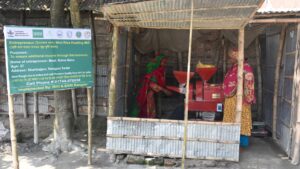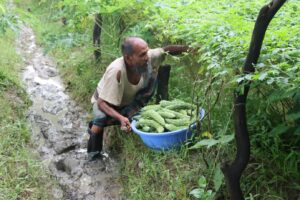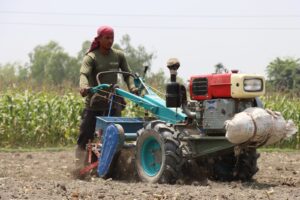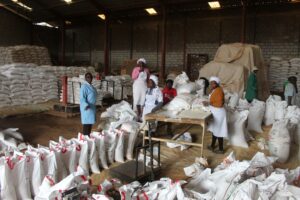by Mosharaf Hossain, Swati Nayak, Divya Gupta, Raja Sekhar G, Sarvesh Shukla, Anirban Nath, and Varsha Singh
Even though Telangana is one of the leading rice-producing states in India, the awareness and options around new varieties among a significant number of smallholder farmers is a major challenge. Providing access to seed, particularly of newer varieties, is a difficult task because of capacity constraints in formal seed systems. Additionally, the community-led seed network is underdeveloped and underutilized by mainstream seed programs. Farmer-led interventions are closing these loopholes, widening the varietal choices available to the farmers, and evaluating on-farm assessment to aid farmers in the selection and adoption of the potential varieties.

Subeejam Sukshetre Jayate Sampadyathe (Good seed in good soil yields abundantly) is mentioned in the ancient Indian scripture Manusmriti reaffirming the significance of quality seeds in rice-based agrarian economies. The importance of quality seeds of best-fit varieties is central to a sustainable food system that catalyzes farm prosperity and augments the livelihood of farmers.
Even though Telangana is one of the leading rice-producing states in India, the awareness and options around new varieties among a significant number of smallholders is a major challenge, according to several stakeholder consultations.
Closing the seed gap for new rice varieties
India’s National Seed Corporation produces seeds of several rice varieties every year, but only a few reach the farmers. As such, farmers are compelled to explore and evaluate better varieties as replacements for their long-grown varieties on their own.
MTU-7029, MTU-1010, and MTU-1001 are rice varieties that are more than two decades old but still dominate the market despite the increasing genetic erosion and susceptibility to pests and diseases. The fragile extension approach effort can be singled out as a prominent reason for poor varietal awareness leading to a low varietal turnover and underutilization of available genetic gain.
Providing access to seed, particularly of newer varieties, is a difficult task because of capacity constraints in formal seed systems. Additionally, the community-led seed network is underdeveloped and underutilized by mainstream seed programs.

.
The Breeding-Integrated Seed System Unit at the International Rice Research Institute (IRRI) is closing these loopholes, widening the varietal choices available to the farmers, and evaluating on-farm assessment to aid farmers in the selection and adoption of the potential varieties.
In Telangana, IRRI, in collaboration with government agencies and community-based organizations, promotes on-farm trials where 5-6 new varieties are assessed against local checks and standard benchmark varieties in farmers’ fields by the farmers.
Key performance traits of trialed varieties are analyzed scientifically to quantify the trait benefits and predicted yield. Thus, the evaluative exercise is more participatory, inclusive, realistic, and collective for setting the next course of action to promote best-fit varieties through different seed networks. This approach offers two fundamental solutions, namely, varietal awareness and selection and accelerated adoption and diffusion as well as improved seed access.

IRRI partnered with the Centre of Sustainable Agriculture (CSA), a non-government organization based in Hyderabad, to select experimental sites and farmers for the deployment of the trials in two districts. CSA also formed a stakeholder interface to create a ripple effect for the trials.
This initiative was conducted during the 2022 wet season in Karimnagar and Jangaon Districts with 40 small and marginal farmers, 14 of whom were women. In total, 30 on-farm trials were undertaken under three priority market segments. In addition, 4 head-to-head trials, and 2 cluster demonstrations were also organized.
A farmer-led seed-scaling model
A field day on crop maturity was held with the participating farmers, other farmers, and agricultural officers who jointly assessed important plant traits and yield potential. Farmers selected the varieties based on significant yield advantages, suitable maturity periods, tillering ability, and marketable grain type. The shortlisted varieties exhibited better performance compared to the local checks and benchmarks. (see Table 1).

The participating farmers were mainly from farmers’ producers organizations (FPOs) involved in the collective production and marketing of agricultural products. IRRI and CSA conducted hands-on seed production training for FPO members and individual farmers interested in seed production.
CSA devised a plan to arrange a revolving fund for seed storage, processing, packaging, and distribution activities for the FPOs. The seed producers also received pure seeds and marketing support.
In a way, this led to the development of community resource persons (CRP). Following this initiative, 40 farmers have taken the intervention and seed to produce at least 80 tons of selected varieties to be marketed for the coming wet season. Moreover, seed production is taking place beyond the two trial districts to include two more districts leading to the horizontal expansion of areas under these varieties.
“I am happy with the performance of the Uttar Sona as it resulted in a higher net income when compared to the local variety,” said Akula Ravi, a participating farmer from the Enabavi Farmers Producer Company that produces seeds of best-rated crop varieties. “I am looking forward to taking up seed production and cultivation of Uttar Son.”
Mr. Mallesh, a resource-poor farmer and a member of his FPO’s Board of Directors, expressed his interest in further producing seeds of BRRI-75 as the variety is suitable for their region. The local farmers also prefer its grain quality.

Support for a seed-secure future
The support for the FPOs does not end with varietal trials and training. The organizations will continue to receive support from facilitating NGOs, state and national government programs, and capacity building and training from various technical agencies for the various aspects of the seed business such as quality control, storage, packing, and marketing in the surrounding areas.

The incubating NGO and IRRI will facilitate the convergence and expansion of this seed entrepreneurship in the coming seasons to continue this process of hand-holding and add enabling factors. Convergence with flagship government schemes and training support from international, national, and local agencies will also be explored.
With a continuous endeavor to receive, evaluate, and select best-fit varieties for farmer-led seed scaling, more FPOs and farmer-growers will be included in the seed system program. Scaling-up activities year-on-year will be done based on further varietal evaluation, market scanning, and business opportunities.
“The effort by IRRI, CSA, and FPOs is an excellent strategy to promote and popularize promising cultivars in the region,” said District Agriculture Officer Vijay Kumar. “The farmer-preferred varieties shall be further multiplied and procured to supply farmers through FPOs.”
Related stories
Rice varietal cafeterias: An effective extension tool for promoting climate-resilient rice
Women farmers’ Crop Cafeteria serves practical rice science
Women-led community seed production and marketing enterprise sows change in Northern Bangladesh






